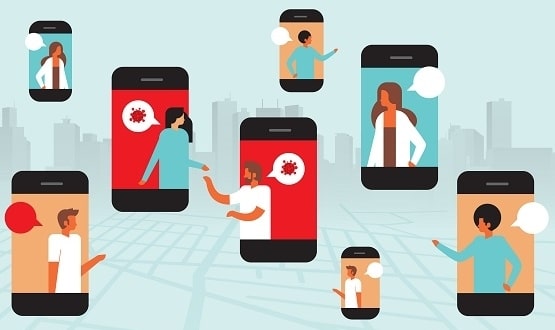Trials of the NHS Covid-19 App ‘not a waste of time’
- 29 September 2020

Trials of the initial NHS Covid-19 app weren’t a waste of time but instead informed new features of the revamped app launched last week, says the founder of a company that helped build it.
A trial of the original app based on a centralised model was launched on the Isle of Wight in May, but following technical issues and concerns about privacy it was abandoned in June.
Instead NHS Test and Trace worked with Apple and Google to develop a decentralised version, heralded as more privacy-centric, which was launched in England and Wales last week. It has since been downloaded more than 10 million times.
Speaking to Digital Health News following the launch, Wolfgang Emmerich, founder of Zühlke Engineering, said he believed the trial proved to be useful.
“I don’t think it [the trial] was wasted at all,” Emmerich added.
“We learned from that trial that actually a good proportion of the population is interested in using an app,” he said.
Zühlke Engineering has been working with NHSX to develop the app since March. The company provided 75 engineers to oversee the app’s development.
The government faced criticism over its decision to initially go its own way developing an app when globally a decentralised model was considered a better option, including that it wasted valuable time in delivering a digital solution.
But according to Emmerich the trials provided useful insight into how people would use the app before making it widely available.
“At the time, the first app would ask people to self-isolate if people they had been in close contact with had reported symptoms. We learned that wasn’t a good idea because it was possible to game the system and send people into isolation just by being close to them and then declaring that you had symptoms,” he told Digital Health News.
“The app that we’ve released now only asks people to self-isolate if they’ve been in close contact with people who have actually tested positive, or if they’ve been at a venue where Public Health England or Public Health Wales or local contact-tracers have established that an outbreak occurred.”
In August – months after the original app was expected to be launched – trials of the revamped app were launched on the Isle of Wight, in the London borough of Newham and with NHS Volunteer Responders.
Emmerich added that the trials also revealed relying solely on digital contact-tracing wasn’t a viable option and that there is a “place for manual contact-tracing to cover people who don’t have smartphones”.
Six updates were made during the trial, including adding multiple languages, the ability to manually enter test results and the ability to change the postcode to view local area risks if a user visits other areas. Emmerich said that more updates will be on the horizon.
“We fully expect that to continue. We have a very large roadmap of enhancements to the app that we will be working on over the next six months and I am expecting we will have learnings similar to what we had during the trial,” he added.
Passed the test?
Despite Emmerich’s claims that the ability to manually enter test results into the app was added during the August trial, many users were unable to add their tests results to the app following its launch.
Test results taken as a result of Office for National Statistics surveys, and those processed by an NHS hospital or Public Health England lab were initially not able to be shared via the app.
The Department of Health and Social Care (DHSC) said everyone who receives a positive test result can now log their result on the app.
A DHSC spokesperson confirmed further developments to the app are underway to allow negative test results to be entered.
Currently a user will only receive a code if they tested positive for the virus. Those who enter their symptoms without entering a test result trigger the self-isolation countdown timer.
Emmerich reassured the app was built “incrementally” and new features would continue to be added as more is learned about how people use the app and the features they need.
Privacy and trust
One of the biggest criticisms of the original operating model of the app was the centralised system it was based on, which would have seen data from the app sent to a centralised NHS database.
Privacy experts warned against this model suggesting it posed too bigger risk of re-identification and mission creep (the original purpose of the data collection can change).
Following the initial trial, and concerns raised by experts, the apps operating model was switched to a decentralised version in a bid to improve privacy and maintain public trust.
“We built the app following the privacy by design principal. None of the sensitive information about where you’ve been and who you’ve been close to ever leave the phone,” Emmerich said.
“There was a lot of worry about the government tracking what you do, who you have been close to and where you have been and none of that will be possible with our app.
“Maintaining public trust in the app is very, very important. Ultimately the more people who use the app the more effective it is going to be in reducing the transmission rate.
“We feel it is important that the public has that trust, which is one of the reasons why we decided to open source the app.”
The code for the app is available on Github.
Digital Health News has created a contact-tracing app timeline feature to keep you up-to-date with the apps journey.




